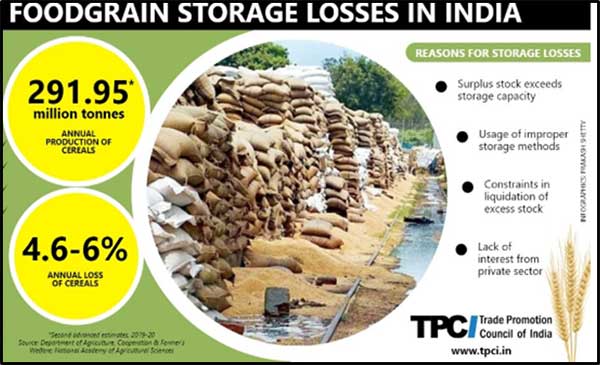Date : 05/06/2023
Relevance: GS Paper 2: Government Policies and Intervention
Keywords: Cooperative sector,Food security, Crop damage,Distress sales, Primary Agricultural Credit Societies (PACS)
Context -
- The Union Cabinet has granted its approval for the establishment of the "world's largest grain storage plan in the cooperative sector" with a budget of approximately Rs 1 lakh crore. This initiative aims to enhance food security, prevent crop damage, and alleviate distress sales by farmers.
Major Highlights of the Grain Storage Plan:
- Objectives: The plan focuses on strengthening food security, reducing wastage, and empowering farmers by creating godowns and agricultural infrastructure at the Primary Agricultural Credit Societies (PACS) level.
- Convergence of Schemes: This ambitious project aims to consolidate eight ongoing schemes from three ministries to address the shortage of agricultural storage infrastructure in India.

- Pilot Project: The Ministry of Cooperation will implement a pilot project in at least 10 selected districts to test and refine the approach.
- Inter-Ministerial Committee: An Inter-Ministerial Committee (IMC) will be established, chaired by the Minister of Cooperation and comprising the Ministers of Agriculture and Farmer's Welfare, Consumer Affairs, Food and Public Distribution, and Food Processing Industries, along with relevant secretaries.
Rationale Behind the Plan:
- Strengthening Cooperatives: The Ministry of Cooperation aims to leverage the strength of cooperatives and transform them into successful business enterprises, aligning with the vision of "Sahakar-se-Samriddhi" (Cooperation for Prosperity).
- Empowering PACS: By establishing agri-infrastructure such as warehouses, custom hiring centers, and processing units at the PACS level, the plan seeks to empower PACS, which play a significant role in the agricultural and rural landscape.
- Wide Reach of PACS: With over 1,00,000 PACS and a membership base of more than 13 crore farmers, the plan aims to enhance the economic viability of PACS and contribute to the growth of the Indian agricultural sector.
Benefits of the Plan:
- Addressing Infrastructure Shortage: The plan aims to establish godowns at the PACS level to alleviate the country's agricultural storage infrastructure shortage. The program aims to raise India's foodgrain storage capacity by 700 lakh tonnes in the cooperative sector. Currently, the grain storage capacity in the country is about 1,450 lakh tonnes.
- Diversification of PACS Activities: PACS will be empowered to undertake various activities, including functioning as procurement centers for state agencies or the Food Corporation of India (FCI), fair price shops, and setting up custom hiring centers and common processing units. This diversification will enhance the incomes of farmer members.
- Reducing Food Grain Wastage: By creating decentralized storage capacity at the local level, the plan aims to reduce grain wastage, contributing to improved food security.
- Preventing Distress Sales: The plan provides farmers with options to prevent distress sales of crops, enabling them to obtain better prices for their produce. The farmers, apart from storing their produce in the facilities, will also be able to get up to 70% loans from these societies.
- Cost Reduction: Establishing storage facilities at the PACS level will significantly reduce transportation costs of food grains to procurement centers and fair-price shops.
Primary Agricultural Credit Societies (PACS):
- PACS is the lowest tier of the Short-Term Cooperative Credit (STCC) structure in India. They operate directly with farmers.
- PACS, established in 1904, is involved in short-term lending, providing credit to farmers for their agricultural needs at the start of the cropping cycle.
- The Union Budget 2023-24 has allocated Rs 2,516 crore for the computerization of 63,000 PACS over the next five years. This move aims to enhance transparency, and accountability, and enable PACS to diversify their operations and undertake additional activities.
Conclusion:
The establishment of the world's largest grain storage plan in the cooperative sector is a significant step towards strengthening food security, reducing wastage, and empowering farmers. By leveraging the strength of cooperatives and empowering PACS, the plan aims to address the shortage of agricultural storage infrastructure and contribute to the growth of the Indian agricultural sector.
Probable Questions for Main Exam-
- Question 1: Critically analyze the role of Primary Agricultural Credit Societies (PACS) in the implementation of the grain storage plan. Discuss the significance of empowering PACS and enabling them to diversify their operations. (10 Marks,50 Words)
- Question 2 : "Explain the objectives and key highlights of the world's largest grain storage plan in the cooperative sector. Discuss how this initiative can address the challenges of food security, crop damage, and distress sales in India. Also, evaluate the potential impact of the plan on the agricultural sector and rural economy." (15 Marks, 250 Words)
Source : The Indian Express








